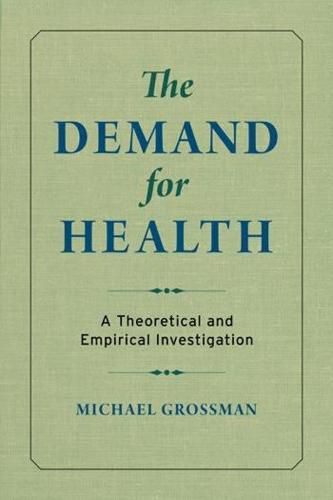Readings Newsletter
Become a Readings Member to make your shopping experience even easier.
Sign in or sign up for free!
You’re not far away from qualifying for FREE standard shipping within Australia
You’ve qualified for FREE standard shipping within Australia
The cart is loading…






A seminal work in health economics first published in 1972, Michael Grossman’s The Demand for Health introduced a new theoretical model for determining the health status of the population. His work uniquely synthesized economic and public health knowledge and has catalyzed a vastly influential body of health economics literature. It is well past time to bring this important work back into print.
Grossman bases his approach on Gary S. Becker’s household production function model and his theory of investment in human capital. Consumers demand health, which can include illness-free days in a given year or life expectancy, and then produce it through the input of medical care services, diet, other market goods and services, and time. Grossman also treats health and knowledge as equal parts of the durable stock of human capital. Consumers therefore have an incentive to invest in health to increase their earnings in the future. From here, Grossman examines complementarities between health capital and other forms of human capital, the most important of which is knowledge capital earned through schooling and its effect on the efficiency of production. He concludes that the rate of return on investing in health by increasing education may exceed the rate of return on investing in health through greater medical care. Higher income may not lead to better health outcomes, as wealth enables the consumption of goods and services with adverse health effects. These are some of the major revelations of Grossman’s model, findings that have great relevance as we struggle to understand the links between poverty, education, structural disadvantages, and health.
$9.00 standard shipping within Australia
FREE standard shipping within Australia for orders over $100.00
Express & International shipping calculated at checkout
A seminal work in health economics first published in 1972, Michael Grossman’s The Demand for Health introduced a new theoretical model for determining the health status of the population. His work uniquely synthesized economic and public health knowledge and has catalyzed a vastly influential body of health economics literature. It is well past time to bring this important work back into print.
Grossman bases his approach on Gary S. Becker’s household production function model and his theory of investment in human capital. Consumers demand health, which can include illness-free days in a given year or life expectancy, and then produce it through the input of medical care services, diet, other market goods and services, and time. Grossman also treats health and knowledge as equal parts of the durable stock of human capital. Consumers therefore have an incentive to invest in health to increase their earnings in the future. From here, Grossman examines complementarities between health capital and other forms of human capital, the most important of which is knowledge capital earned through schooling and its effect on the efficiency of production. He concludes that the rate of return on investing in health by increasing education may exceed the rate of return on investing in health through greater medical care. Higher income may not lead to better health outcomes, as wealth enables the consumption of goods and services with adverse health effects. These are some of the major revelations of Grossman’s model, findings that have great relevance as we struggle to understand the links between poverty, education, structural disadvantages, and health.